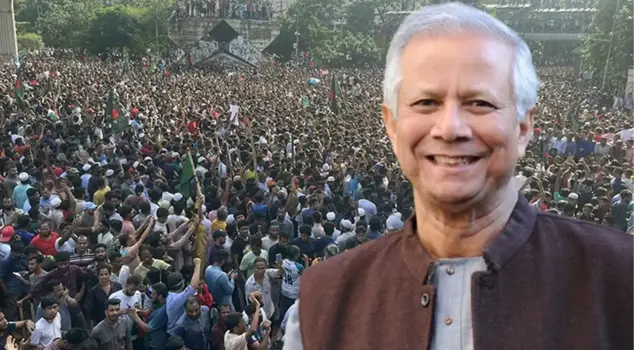
07.08.2024 00:21
After the official residence of Prime Minister Sheikh Hasina was stormed during anti-government protests in Bangladesh, a new leader has been announced. Nobel Peace Prize laureate Muhammad Yunus will lead the interim government to be established in the country where the parliament has been dissolved. The other members of the government under Yunus' leadership will be determined soon.
The head of the interim government, which was established after Prime Minister Sheikh Hasina Wazed left the country during anti-government protests in Bangladesh, has been appointed as Nobel Peace Prize winner Muhammad Yunus, according to Dhaka Tribune newspaper.
Officials confirmed that Muhammad Yunus, the Nobel Peace Prize winner, was appointed as the head of the interim government as a result of a meeting between Bangladesh President Muhammad Shahabuddin and leaders of the Student Anti-Discrimination Movement.
NOBEL LAUREATE YUNUS BECOMES INTERIM PRESIDENT
Officials also stated that the remaining members of the transitional government will be determined after consultations with various political parties.
Student-led protests began in mid-July in Bangladesh after a decision was made to allocate quotas in the public sector for the children of those who served in the 1971 War of Independence. The protests were announced to have ended after the Supreme Court reduced the quota rates at the end of July. Following the ban on the Jamaat-e-Islami Party and the student wing, who were held responsible for the violent incidents during the protests, the demonstrators took to the streets once again, this time calling for "justice" for those who lost their lives in the demonstrations.
During the protests in Bangladesh, hundreds of people lost their lives in violent incidents and thousands were detained. As the violence continued to escalate, Prime Minister Sheikh Hasina left her official residence and went to India by military helicopter, while the protesters stormed the Prime Minister's official residence. Bangladesh Army Commander General Waker-Uz-Zaman, who met with representatives of political parties, announced that Hasina had resigned and a transitional government would be formed.
Nahid Islam, one of the coordinators of the student protests, had stated that they wanted Nobel Peace Prize winner Muhammad Yunus to lead the transitional government in the country. Lamiya Morshed, Executive Director of Yunus Centre, a think tank led by Nobel Peace Prize winner Muhammad Yunus, had made a statement to the BBC.
Morshed stated that Yunus, who is currently in Paris, will soon return to Dhaka, saying, "How can I refuse the request of students who have made so many sacrifices and want me to intervene in this difficult period?"
84-year-old Muhammad Yunus, who has long been seen as a rival by Hasina, is known as the "banker to the poor". Many allegations have been made that Nobel laureate Yunus has been targeted in Bangladesh due to the cold relations between him and Sheikh Hasina.
A group including former US President Barack Obama, former UN Secretary-General Ban Ki-moon, and many other famous figures sent a letter to Sheikh Hasina, requesting the suspension of the legal process against Yunus. Muhammad Yunus was awarded the Nobel Peace Prize in 2006 for his establishment of Grameen Bank and pioneering work.